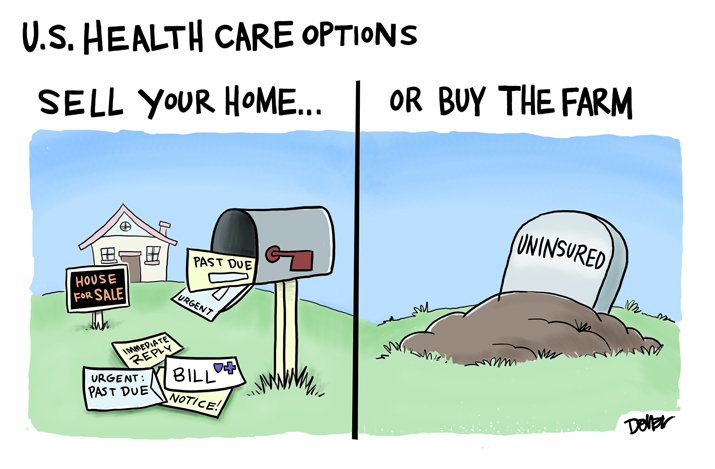Dr. Flynn mentioned numerous surprising statistics in his talk about healthcare. Right off the bat, he said that the United States spends 18% of its GDP on healthcare, while Singapore spends about 4% of its GDP on healthcare. After looking up the healthcare debt of America, I found that "... collection agencies held $140 billion in unpaid medical bills..." in 2020.
(Kliff) Additionally, the medical debt is expected to grow more because medical costs have increased 33% in the past 30 years while the income has grown 30%. Later in his talk, Dr. Flynn mentioned the cost of open-heart surgery in the U.S. and Singapore. He said the cost of open-heart surgery in America is about $130000 and the cost of open heart surgery in Singapore is around $18,000. I was interested to see what percentage of a person's yearly income contributed to the surgery. For Americans with an average income of $63,214, open heart surgery is 206% of their income, meaning they would have to save their entire income for more than two years to be able to afford open-heart surgery. For Singaporeans, the average yearly income is 79,200 U.S. dollars, so open-heart surgery would be 23% of their income for the entire year. This statistic was so surprising that I decided to research more health-related facts about Singapore. I found that the leading cause of death in Singapore is cancer, which many know to be a very difficult disease to cure throughout the world. (Lim) The leading cause of death in the U.S., however, is heart disease, which can often be treated and sometimes reversed with medical care. A part death trends can be attributed to the difference in healthcare systems between the two regions. Because Singapore's healthcare is immensely cheaper than that of the U.S., more people can afford to treat heart disease thus improving their life span. An interesting and beneficial aspect of Singapore's healthcare that Dr. Flynn touched on was Medisave. Although this concept seems to be very beneficial not only because humans struggle to save, it reflects a little bit of socialism. The forcing of funds towards a program seems minorly socialistic, but because of the success of Singapore's healthcare system, it demonstrates that some government intervention is not only permissible, but advantageous. Finally, a point Dr. Flynn made that was impactful was the statement about people being better off without Medicaid because of the terrible quality of doctors that accept it. With serious diseases, Medicaid can rationally be assumed to cause the patient's state to worsen, but when it comes to less serious diseases, it is harder to make a similar assumption. To counter Dr. Flynn's statement, I also think that the environment of the receivers of Medicaid should be taken into consideration. Because the people receiving Medicaid likely live in a worse environment than those with private insurance, they are more likely to be in worse physical condition. In conclusion, Dr. Flynn made a powerful argument about the good example Singapore is setting in healthcare and why the U.S. should be proactive in resembling it.

Image Source
Sort: Trending